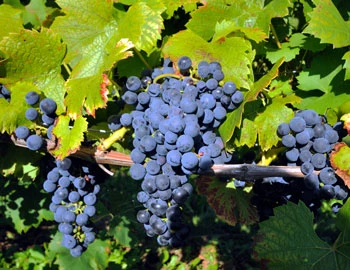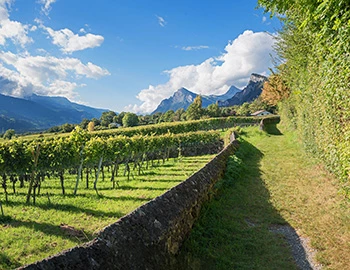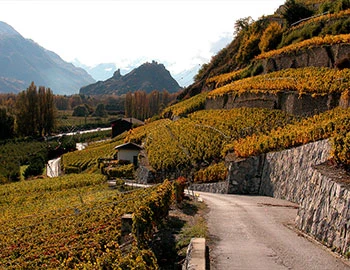Plural 2023
AOC Uetikon, Erich Meier, 750 ml

| Grape variety: | Diolinoir, Pinot noir |
| Producer: | Erich Meier |
| Origin: | Switzerland / Ostschweiz / Zürich |
| Other vintages: |
Attributes
| Origin: | Switzerland / Ostschweiz / Zürich |
| Grape variety: | Diolinoir, Pinot noir |
| Label: | Vegan |
| Ripening potential: | 2 to 7 years |
| Drinking temperature: | 16 to 18 °C |
| Food Pairing: | Wild specialities, Wild boar entrecôte with Spätzli, Bistecca fiorentina, T-Bone steak, Saddle of lamb fillet with herb jus, Roast saddle of venison, Spicy hard cheese |
| Vinification: | fully destemmed, short must fermentation |
| Harvest: | hand-picking |
| Maturation: | long cultivation, in partly new and used barriques/ Pièces |
| Maturation duration: | 12 months |
| Volume: | 14.0 % |
| Note: | Contains sulphites |
Diolinoir
Unanticipated qualities
Many new varieties are initially underestimated. So it proved with Diolinoir, a cross between Pinot noir and an old French grape by the name of Robin noir. The latter was found in the 1920s in a vine collection in Diolly, in Valais. As it was not known where it had been cultivated, the red immigrants were simply called Rouge de Diolly. When it was crossed in 1970, the name Diolinor came from “Diolly” and “noir”. Not much was expected of these grapes: they were only grown to lend a hand colour-wise to other Swiss varieties. In recent years, however, vintners have discovered that they are capable of much more. When produced in wooden casks, they mature into well-grounded wines with aromas of blackberries and black cherries, as well as solid, round tannins. Definitely try Diolinoir with lamb.

Pinot noir
Blueprint of the terroir
No other variety expresses its terroir as precisely as Pinot noir. It is a sensitive, fragile grape. But when it succeeds, it gives the world some of its very greatest wine plants. It especially excels in Burgundy, where it has been cultivated for at least 700 years. Even in the middle ages, it was considered so precious that it was kept separate from other grapes so as to not diminish its value. The finest examples are delicate and fragrant with aromas of cherries and red berries. With maturity, notes of forest floor, leather and truffles enter as well. An irresistible fruity sweetness still shines through, even after several decades. The Pinot noir does well in cool locations: in Switzerland and in Germany, where it is known as Blauburgunder and Spätburgunder respectively; in Alsace and in South Tyrol, in Oregon, New Zealand and Tasmania. Not least, it yields fantastic champagnes. It is a wonderful culinary companion. With its soft tannins and charming bouquet, it meshes with everything, from Güggeli and cheeses to fried fish.

Zürich
Zurich: On the way to the top
With a cultivated area of 620 hectares, Zurich is the largest wine-producing canton in German-speaking Switzerland. The potential is great at prime locations on Lake Zurich and in the various river valleys. It is no surprise that a steadily increasing number of top wines are vinified here. The major variety is Pinot Noir. But white varieties also exceed exquisitely, such as Müller-Thurgau and the long-established Räuschling, as well as international varieties like Chardonnay and Sauvignon Blanc. The wine-producing canton of Zurich is currently experiencing the most sustained upswing in quality in its history.

Ostschweiz
Eastern Switzerland: an intriguing puzzle
Eastern Switzerland has long been positioned on the northern rim of the climate zone where the cultivation of popular Swiss varieties is possible. Due to a warming climate, the vineyards of Aargau, Zurich, Schaffhausen, Thurgau and Graubünden are now in the zone where varieties such as Müller-Thurgau or Pinot Noir succeed excellently. But even long-established, almost-forgotten varieties such as Elbling, Räuschling and Completer are experiencing a renaissance.

Switzerland
Switzerland – A small country with enormous diversity
Switzerland is famous for its banks, watches, and cheese, but not necessarily for its wine. The Swiss didn't invent wine, but they have been extremely open and curious to it. Wine culture arrived in what is now modern Switzerland via several routes: from Marseilles to Lake Geneva and the Lower Valais region; from the Aosta Valley through the Great St. Bernard Pass to the rest of Valais; from the Rhone through Burgundy, across the Jura Mountains to Lake Constance; and from Lombardy to Ticino, and then on to Grisons.



